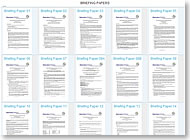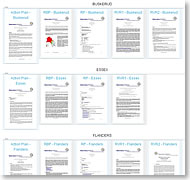Action Plan - Flanders
| Attachment | Size |
|---|---|
| Action_Plan_-_Flanders.pdf | 37.71 KB |
Embedded Scribd iPaper - Requires Javascript and Flash Player
Observatory PASCAL
Place Management, Social Capital and Learning Regions PASCAL Universities Regional Engagement Project (PURE) ACTION PLAN FLANDERS, BELGIUM July 2009 to December 2010 1. July 2009 New composition of the RCG (Regional Consultative Group) with fewer members of Higher Education and more representatives of society (authorities, cities, ports) and business. More widespread networking + holistic thinking. New composition of the CDG (Consultative Development Group): team leader will be John Field, other members: Peter Welsh, Barry Hake and N.N. HEI’s benchmarking tools are trialled and time-schedules are made to send them to the HEI’s (faculties and departments) with deadlines for answering. The Regions benchmarking tool is studied and lists of participants made. Sub-clusters leader on “Social inclusion and active citizenship” has to be identified. Contact with Kent (Peter Welsh) and via him with the region Nord-Pas de Calais (2nd cohort). Gathering examples of good practice (see Report 1, literature, Flanders’ HEI’s). Contact with John Field and the Glasgow Office.
2. August 2009 Collecting of recent figures and statistics concerning Flanders, its economy, its population, its Higher Education: every figure must be evidence-based. Note on the principles lying behind regional engagement, based upon the figures and good practices gathered, on the third mission and holistic thinking. Preparing the sub-cluster project. Between 17 and 31 of August: meeting(s) with the RCG and preparing a sub-cluster-meeting with Kent and Nord-Pas de Calais and a full day conference. At the end of September 2009 with representatives of all Flemish HEI’s, preparing them to answer the benchmarking tool “Benchmarking the regional contribution of universities”.
3. September 2009 – October 2009 Sub-cluster meeting in the first half of the month on “Social inclusion and active citizenship”. 28.09.09: Full day conference on regional engagement with representatives of all Flemish HEI’s preparing the participation on the benchmarking tool. (If possible with an introduction by John Field and/or Chris Shepherd and a key note by Dirk Van Damme, OECD), and introducing the 2nd round visit. Benchmarking tool has to be answered in all Flemish HEI’s, faculties, departments. The Regions benchmarking tool is introduced and cities, provinces, business a.o. are invited to answer the Regions benchmarking tool. Meeting of the RCG with first conclusions on the benchmark and starting preparing the 2nd visit.
4. November 2009 – December 2009 Organizing together with Kent University and Kent Council and with VLUHR (Flemish Council of Universities + University colleges of applied science) and VIA (“Flanders in Action”)+ VLEVA (Flemish European liaison agency) a full day conference on “Community engagement or bridging the wider society with the university” with sub-themes concerning :
Action Plan – Flanders
http://www.obs-pascal.com/
P a g e
|1
Observatory PASCAL
Place Management, Social Capital and Learning Regions o o o o o contribution to the economic development; to social and cultural development; to entrepreneurship and employability; to research development and innovation; to social inclusion and active citizenship.
Preparing a compilation of good practices to be found in Flanders’ HEI’s.
5. January 2010 – end of February 2010 Preparation of the second peer visit (might be planned on 17-18-19th of February or on 10-11-12 of March 2010). Compiling all good practices found in Flanders in a kind of PURE-template. Making summaries of the outcomes of the two benchmarking exercises. Meeting with the RCG on the results so far. Spring workshop at OECD in Paris.
6. March 2010 – April 2010 The benchmarking tools and their further use: consideration with the users so far. Regional engagement and the Bologna process: embeddedness of the third mission? Lessons learned so far. Sub-cluster meeting. The PURE Regional Visit Report 2 concerning Flanders: considerations on the project outcomes and meeting upon it with the RCG.
7. May 2010 – June 2010 Pascal Jamtland International Conference with the PURE reports on the 15 regions that participated in the project on the forefront. 26th May: a day seminar on the third mission. in the city of Genk, in the framework of the Cumulus conference. Writing the overall report and measuring the progress made. Outline frameworks for the summary reports are made available. Each participating region provides a summary that will be included in the final synthesis report by December 2010.
8. From July 2010 Work on the 1st cohort Action Plans, benchmarking etc., continues. Meeting of all PURE-regions in Gaborone in conjunction with the PASCAL conference and end of cohort 1. Final Flanders’ PURE-meeting (November – December 2010) with all those who were and are involved: universities, university colleges, policy makers, business organisations, professionals out of the social and cultural sector, cities, ports and communities. Conclusion: the overall PURE-project will by then have been developed and worked out in more than 15 regions worldwide and will undoubtedly have proven that the HEI’s contribution to society, the third mission, is highly important while it develops a collective intelligence and a sustainable determination that guides communities and regions through economic peaks and troughs.
Action Plan – Flanders
http://www.obs-pascal.com/
P a g e
|2
Observatory PASCAL
Place Management, Social Capital and Learning Regions PASCAL Universities Regional Engagement Project (PURE) ACTION PLAN FLANDERS, BELGIUM July 2009 to December 2010 1. July 2009 New composition of the RCG (Regional Consultative Group) with fewer members of Higher Education and more representatives of society (authorities, cities, ports) and business. More widespread networking + holistic thinking. New composition of the CDG (Consultative Development Group): team leader will be John Field, other members: Peter Welsh, Barry Hake and N.N. HEI’s benchmarking tools are trialled and time-schedules are made to send them to the HEI’s (faculties and departments) with deadlines for answering. The Regions benchmarking tool is studied and lists of participants made. Sub-clusters leader on “Social inclusion and active citizenship” has to be identified. Contact with Kent (Peter Welsh) and via him with the region Nord-Pas de Calais (2nd cohort). Gathering examples of good practice (see Report 1, literature, Flanders’ HEI’s). Contact with John Field and the Glasgow Office.
2. August 2009 Collecting of recent figures and statistics concerning Flanders, its economy, its population, its Higher Education: every figure must be evidence-based. Note on the principles lying behind regional engagement, based upon the figures and good practices gathered, on the third mission and holistic thinking. Preparing the sub-cluster project. Between 17 and 31 of August: meeting(s) with the RCG and preparing a sub-cluster-meeting with Kent and Nord-Pas de Calais and a full day conference. At the end of September 2009 with representatives of all Flemish HEI’s, preparing them to answer the benchmarking tool “Benchmarking the regional contribution of universities”.
3. September 2009 – October 2009 Sub-cluster meeting in the first half of the month on “Social inclusion and active citizenship”. 28.09.09: Full day conference on regional engagement with representatives of all Flemish HEI’s preparing the participation on the benchmarking tool. (If possible with an introduction by John Field and/or Chris Shepherd and a key note by Dirk Van Damme, OECD), and introducing the 2nd round visit. Benchmarking tool has to be answered in all Flemish HEI’s, faculties, departments. The Regions benchmarking tool is introduced and cities, provinces, business a.o. are invited to answer the Regions benchmarking tool. Meeting of the RCG with first conclusions on the benchmark and starting preparing the 2nd visit.
4. November 2009 – December 2009 Organizing together with Kent University and Kent Council and with VLUHR (Flemish Council of Universities + University colleges of applied science) and VIA (“Flanders in Action”)+ VLEVA (Flemish European liaison agency) a full day conference on “Community engagement or bridging the wider society with the university” with sub-themes concerning :
Action Plan – Flanders
http://www.obs-pascal.com/
P a g e
|1
Observatory PASCAL
Place Management, Social Capital and Learning Regions o o o o o contribution to the economic development; to social and cultural development; to entrepreneurship and employability; to research development and innovation; to social inclusion and active citizenship.
Preparing a compilation of good practices to be found in Flanders’ HEI’s.
5. January 2010 – end of February 2010 Preparation of the second peer visit (might be planned on 17-18-19th of February or on 10-11-12 of March 2010). Compiling all good practices found in Flanders in a kind of PURE-template. Making summaries of the outcomes of the two benchmarking exercises. Meeting with the RCG on the results so far. Spring workshop at OECD in Paris.
6. March 2010 – April 2010 The benchmarking tools and their further use: consideration with the users so far. Regional engagement and the Bologna process: embeddedness of the third mission? Lessons learned so far. Sub-cluster meeting. The PURE Regional Visit Report 2 concerning Flanders: considerations on the project outcomes and meeting upon it with the RCG.
7. May 2010 – June 2010 Pascal Jamtland International Conference with the PURE reports on the 15 regions that participated in the project on the forefront. 26th May: a day seminar on the third mission. in the city of Genk, in the framework of the Cumulus conference. Writing the overall report and measuring the progress made. Outline frameworks for the summary reports are made available. Each participating region provides a summary that will be included in the final synthesis report by December 2010.
8. From July 2010 Work on the 1st cohort Action Plans, benchmarking etc., continues. Meeting of all PURE-regions in Gaborone in conjunction with the PASCAL conference and end of cohort 1. Final Flanders’ PURE-meeting (November – December 2010) with all those who were and are involved: universities, university colleges, policy makers, business organisations, professionals out of the social and cultural sector, cities, ports and communities. Conclusion: the overall PURE-project will by then have been developed and worked out in more than 15 regions worldwide and will undoubtedly have proven that the HEI’s contribution to society, the third mission, is highly important while it develops a collective intelligence and a sustainable determination that guides communities and regions through economic peaks and troughs.
Action Plan – Flanders
http://www.obs-pascal.com/
P a g e
|2








